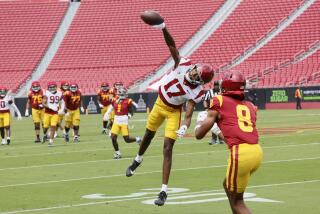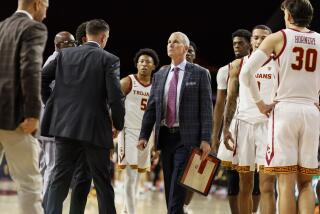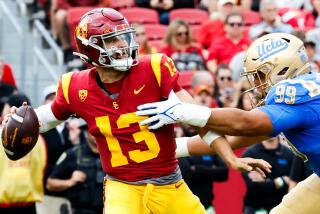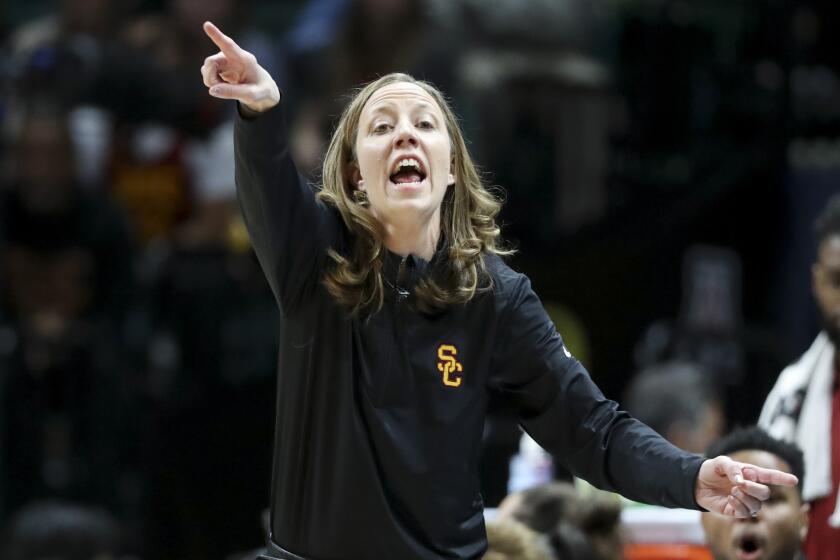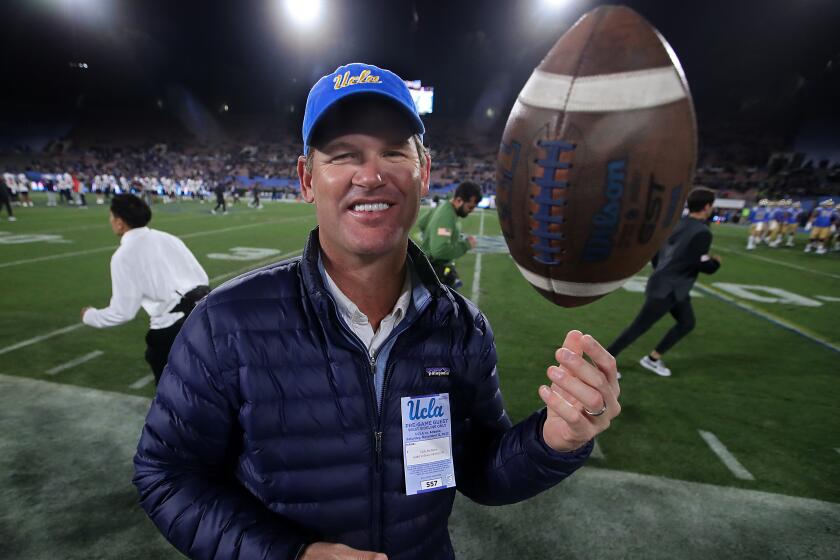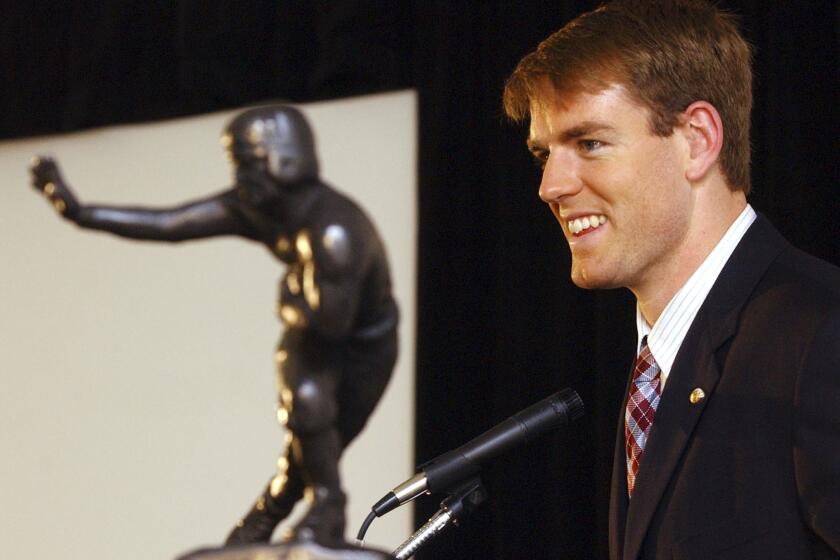On the brink of a division title against Colorado, USC has shifted to a run-first team
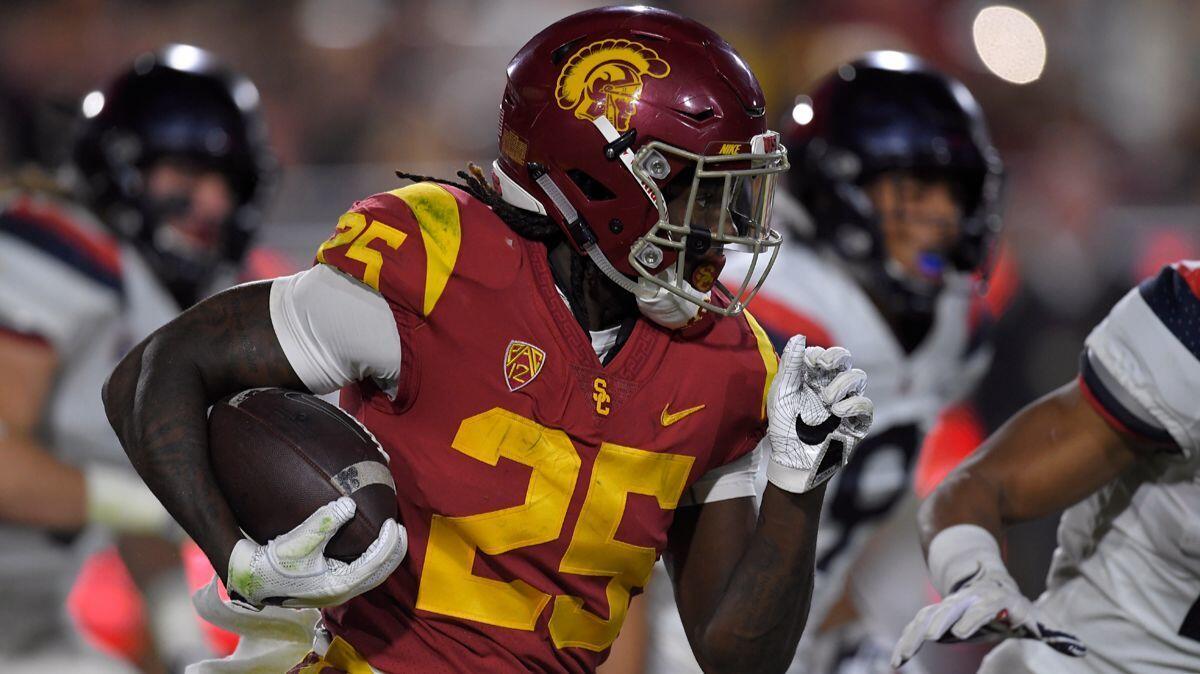
Early in USC’s game last weekend against Arizona, Ronald Jones II lined up inside USC’s own end zone. He took a handoff up the middle, bumped into the backside of right tackle Chuma Edoga and catapulted outside 98 yards down the numbers to the other end zone.
He looked back. A flag lay on the ground near the line of scrimmage. His head slumped to one side dejectedly, and he jogged off, chest still heaving, to the sideline for a breather.
No matter. USC lined up and ran it again with Aca’Cedric Ware. Ten yards. Then again. Eleven yards. The Trojans would run that drive again and again and again throughout the game.
In the end, USC finished with twice as many runs as passes.
The game marked a shift in USC’s offensive philosophy, from an approach balanced between the run and the pass to a more pragmatic, flexible attack. What emerged was an offense that looked more like USC’s offenses of seasons past: physically imposing and run-first with a heavily used premier back.
USC, said Jones, who finished with 194 yards, “imposed our will on the defense.”
Coach Clay Helton says he is still committed to balance, but USC’s remaining two regular-season games, starting with a trip to Colorado on Saturday, will tempt. Colorado ranks 11th in the Pac-12 Conference in rush defense, at 199 yards per game. Only UCLA, USC’s next opponent, is worse.
The games will test the permanence of the pivot to the running game. Was it a short-lived aberration? Or something more lasting?
“You do what you gotta do to win the game,” offensive coordinator Tee Martin said. “When you’re doing something really well, you stick to it.”
Two of USC’s best offensive games have come in the past two weeks, when USC relied heavily on Jones. The idea is not revolutionary — former USC running back LenDale White said this week that Jones would be a Heisman Trophy candidate and USC might have only one loss had it given Jones the ball more often.
Martin said he wasn’t planning on giving Jones 27 carries, the most of his career, on Saturday.
But as the game went on, he said, “I was feeling RoJo, man. He was going. He was seeing things. He was cutting; his speed was good. Sometimes you see RoJo, his hands go on his hips, and it’s time to get him out. But I could tell he was feeling it. He was the same way at Arizona State. Sometimes you can just tell that he wants more.”
Usually, the balanced formula serves USC well. It has one of the nation’s best quarterbacks and one of the best running backs. Defenses have trouble stopping both.
“I think the play-calling has been consistent all year round,” Helton said. “I’ve been really pleased with what Tee’s done. When you think about where we are right now, we are a very balanced offense. We’re rushing for over 200 yards a game, throwing for almost 300. It’s the best offensive numbers since 2005 right now.”
But Saturday’s run-to-pass ratio was USC’s most skewed since a win over UCLA two seasons ago, when USC rushed 59 times and passed just 26. That victory precipitated Helton’s hire as head coach. It also clinched a spot in the Pac-12 Conference championship game, something the Trojans have the chance to do again with a win on Saturday.
Several USC players asked last weekend couldn’t recall how many times USC has won the Pac-12 South division. The answer is just once. They couldn’t recall how many Pac-12 titles USC has won. The answer is zero.
The conference’s expansion to 12 teams coincided with a downturn for USC. The result was this oddity: In the conference’s biggest game, the team many would consider to be the Pac-12’s flagship has been mostly irrelevant.
The Trojans can mark a reversal Saturday by claiming their second South division title in three seasons. Even with a loss Saturday, USC would remain well-positioned to clinch. It would need a win over UCLA in its final regular-season game or losses from Arizona and Arizona State.
The Trojans would prefer to leave nothing to chance, and Martin indicated the best way to avoid calamity is to take care of the ball.
“To win championships and to win in November, you’ve got to be able to run the ball,” Martin said.
Then he stopped himself.
“Colorado’s watching this interview, so I don’t know,” Martin said, laughing. “We’re gonna be balanced.”
Follow Zach Helfand on Twitter @zhelfand
More to Read
Go beyond the scoreboard
Get the latest on L.A.'s teams in the daily Sports Report newsletter.
You may occasionally receive promotional content from the Los Angeles Times.
